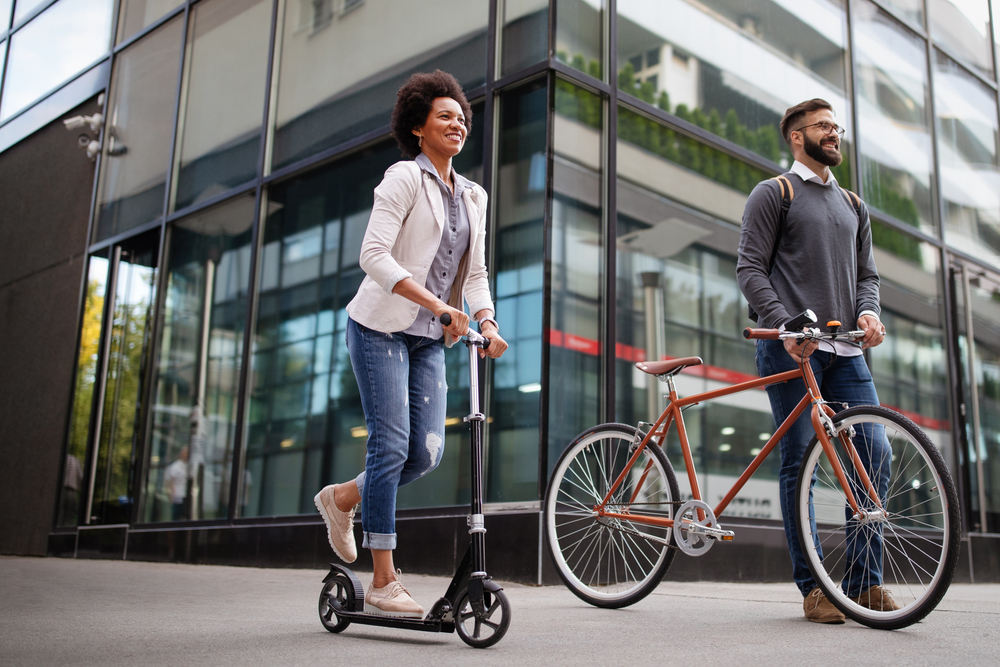For the last five years, Felicity has done everything she personally can to care for the environment and try to halt climate change. She cycles and walks instead of taking her electric car on shorter journeys, often stopping to pick up litter. The tumble dryer stands redundant in her utility room and she cooks vegetarian meals for the family five times a week.
On top of that, she recycles everything – from her toothpaste tubes to her children’s crisp packets. Her clothes are from second hand shops or eBay and she even has a wormery so waste food can be used to feed her garden. As well as a weekly trip to the refill shop, she’s banned single-use plastics in her house.
Sounds like the perfect eco household? Well, almost. Except her husband Tomas insists on eating meat whenever he’s out of the house, brings home bags full of products in plastic and thinks nothing of using the car to pop a kilometre down the road. Tomas doesn’t care if things have palm oil in them – as long as they taste good. And he’s always surprising Felicity with romantic trips to Europe which means flying and adding to her carbon footprint and global warming.
‘He carries on, eating meat, throwing everything into landfill and ignoring the news about climate change, extreme weather and ocean pollution’
‘Tom makes me so angry,’ rages marketing director Felicity, 47. ‘I tell him we won’t have a planet for our children’s children if we all carry on like this but that doesn’t seem to bother him. I ask him to think about our children – they’re eight and 12. Even that doesn’t help. He carries on, eating meat, throwing everything into landfill and ignoring the news about climate change, extreme weather and ocean pollution.
‘We end up having enormous rows. Several times a year I wonder if I can carry on living with him. But then I remember he’s a good husband and dad and I love him. I just don’t love his attitude to the environment.’
It may be infuriating for Felicity but she’s not alone. According to experts, many couples have a disconnect in their attitude to climate change. When researchers at the Yale Program on Climate Change Communication in the US surveyed 758 couples, they found only 38 per cent of them shared the same beliefs about climate change. Just 31 per cent shared the same behaviour, like donating to climate change causes and signing petitions.

And the London-based market research company Mintel discovered 71 per cent of women ‘try to live more ethically’, compared to 59 per cent of men. Habits examined include recycling, water conservation in the home and composting food waste.
Becki Houlston, a UK-based therapist, says this situation boils down to a difference in our values and it’s a common problem between couples – one that could take them to the brink of divorce or even cause them to break up.
‘If saving the planet is important to one person and not the other there’s likely to be a conflict of values. It can cause arguments and a power struggle. It can even lead to a breakdown of the relationship’
Therapist Becki Houlston
‘Values are what’s important to us in life so if making a difference or saving the planet is important to one person, and not to the other, you’re likely to have a conflict of values,’ she explains. ‘When someone doesn’t acknowledge or follow what we think is important, we can attach the meaning that we don’t matter to them and it can drive a wedge between us and cause arguments and a power struggle. It can even lead to a breakdown of the relationship.’
Jasmine Navarro, who runs a coaching business – NAVA – in Dubai, agrees. ‘We all know the saying that opposites attract and it is very true,’ she says. ‘Nearly all couples have some differences between them. It could be what music they like and whether they’re a football fan or not.
‘In the case of climate change, it can be tricky to negotiate practical matters like, for example, what food you buy at the supermarket. If one wants to buy products without plastic packaging but the other insists that their favourite brand is better, even if it does come in a plastic bottle, that can lead to clashes.’
The problem is we didn’t deliberately choose a partner who wouldn’t recycle, eat vegetarian food or use an electric car. When many long-term couples got together, we weren’t as aware of the urgency to protect the environment as we are today.
‘Although scientists have been sounding the alarm for more than 30 years about climate change, there are still a lot of people who haven’t understood the messages they’ve been trying to give us,’ continues Jasmine. ‘While some have been recycling diligently for years, others are just starting to do it, maybe after seeing a recent severe weather event that has brought these issues to their attention. Even those who take the issue seriously can have a different sense of urgency.’

Luckily, some dating apps like OKCupid now allow users to pick and choose a green mate. But what can we do if we’ve already settled with a climate denier? Can we persuade them to change their mind and behaviour or is our relationship itself doomed?
Start Small
‘Literally every area of our lives affects climate change,’ says Jasmine, who coaches adults through life changes. ‘Take the furniture you’re sitting on right now and the clothes you’re wearing. Were they made sustainably? It can be overwhelming to realise how much living in a developed country contributes to climate change.
‘If you’re trying to help your partner to incorporate more environmentally-friendly practices in their life, don’t try to do everything at once. Pick an area that’s easy to change – like re-usable shopping bag. That way, you’ll get an easy win and you’ll all feel motivated to continue.
“Small, regular habits take about 20 repetitions of the behaviour before they become engrained as a new habit. Your partner could put the bags on the inside of the front door or in their car boot. After a few weeks they won’t need the reminder. It’s now a habit.
“You can use this to introduce one change at a time, waiting for it to become a habit before moving on to the next to make it easier and a lot less uncomfortable.’
Devise Some Dealbreakers
If you’re sharing a home, then agree on a few things that are really important to you, suggests Becki.
‘It might be that reducing plastics, especially single use ones, in your house or cutting down on the number of short haul flights you do as a couple would ease the conflict between you. When you see your partner making an effort, you’ll feel as if your values are being recognised. They might not be as dedicated to the environment as you are, but you’ll see they’re making an effort.’

Choose fun ways to introduce greener activities into both your lives. Leave the car at home and go out for a bike or scooter ride. If your partner sees how cool it can be to care about climate change they’ll be more willing to make a difference.
Note Your Tone
When you feel passionate about a cause and frustrated with a partner, it’s easy to get angry and flare up.
‘Things can get out of hand if either one or both of you become confrontational,” says Jasmine. ‘Show them respect so they will show it back to you.
‘When you’re putting your point across, you can remind them that an eco-friendly lifestyle will not only benefit the planet and wildlife but your partner, too. By switching from tumble drying to hang drying, you can drastically cut your electricity bill. Buying organic products can boost your physical and mental health and cycling to work rather than driving will keep you active. Pointing out the positive aspects of going green can help your partner see things in a different light.’
Offer Help
Sometimes, we’re so perplexed by an issue that we avoid it and stick our heads in the sand. But a little research or guidance could work wonders.
‘Starting a new practice can be overwhelming,’ explains Becki. ‘Your partner might be perfectly willing to get refills from the environment shop, but they may be clueless about what containers they need, and even what to do once they’re in the store.
‘Offer to go with them the first time. Show them what needs doing and how easy it would be.’
Meet Halfway

See your partner’s unwillingness to get involved in environmental issues as a temporary situation, recommends Jasmine.
‘In the meantime, be a good role model. Start with your own shopping habits, recycling and carbon reducing activities and talk about the positive benefits you’re experiencing. Hopefully, they’ll want to emulate you. Make recycling easy at home. If a recycling bin is close by, people are more likely to use it.’
Join a Group
If you feel you’re not getting any support or understanding for your conservation efforts or anxieties at home, joining a group will give you a great sense of community.
‘Spending time on issues we care about is important for our own sense of identity and wellbeing,’ says Jasmine. ‘If one partner wants to spend two hours a week volunteering to clean up a beach, it will be rewarding for them and it gives their partner a chance to do some of their favourite activities too. When people feel fulfilled as individuals, they bring a lot more to the partnership.’













